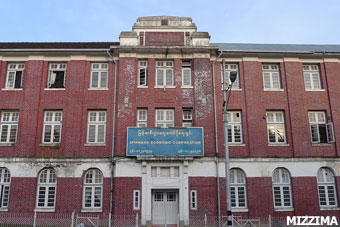As debate begins on a potential softening of European Union (EU) sanctions against Burma, the Austrian Embassy in Bangkok has declined to deny reports that Ambassador Dr. John Peterlik led a delegation of Austrian businessmen to Burma this month...
Chiang Mai (Mizzima) – As debate begins on a potential softening of European Union (EU) sanctions against Burma, the Austrian Embassy in Bangkok has declined to deny reports that Ambassador Dr. John Peterlik led a delegation of Austrian businessmen to Burma this month.
 A spokesperson for the Austrian Embassy said it would have no comment on the report.
A spokesperson for the Austrian Embassy said it would have no comment on the report.
Delegates from 23 Austrian companies met members from the Union of Myanmar Federation of Chambers of Commerce and Industry (UMFCCI), a source told Mizzima.
‘They met some individual businessmen and most are traders from UMFCCI. They met in a hotel and their trip took two days,’ said the source.
‘They brought the delegates to see what kind of business opportunities they could find in Burma,’ he said.
The business delegation visit, if true, comes during the lead up to an EU heads of state meeting in April in which EU sanctions on Burma will be debated.
In February, a spokeswoman for EU foreign affairs chief Catherine Ashton said Burma would be on the agenda of the council meeting.
‘What I can say is that obviously we are in a listening mode,’ Maja Kocijancic said, when asked if the EU would consider softening sanctions on Burma. ‘We are consulting all relevant stakeholders and once this issue comes on the council agenda, we will see what decision there will be on the way forward.’
However, the EU foreign affairs office is playing down the significance of a possible Austrian government-endorsed business delegation.
Kocijancic told Mizzima that ‘there is no reason to assume that a trade delegation of an EU member state infringes on the EU sanctions regime.’
‘There are no broad EU trade or investment sanctions on Myanmar (Burma), but sectoral prohibitions,’ said Kocijancic.
She said that EU member states self-regulate the implementation of the EU restrictive measures imposed on Burma and ‘are not required to notify the EU bodies about their activities’.
Current EU trade sanctions against Burma include a ban on exports of timber, metals and precious stones. Other sanctions target the country's top officials and their families including a freeze on assets and travel bans.
Last week, about 25 EU ambassadors and diplomats held talks with the leader of the National League for Democracy (NLD), Aung San Suu Kyi, and five political party leaders about lifting sanctions.
‘The diplomats will pass the messages of the political parties and pro-democracy activists on to their governments. Then, they will make the decision’, said the National Democratic Force (NDF) leader, Khin Maung Swe.
A letter, signed by 10 Burmese political parties, calling for an end to sanctions against Burma was given to the EU delegation.
The National League for Democracy is opposed to a lifting of sanctions, a position it confirmed at a party meeting in February.
NLD senior leader Win Tin told Mizzima that targeted sanctions are ‘a political weapon’.
‘I think the sanctions should be extended. I support Aung San Suu Kyi’s idea of lifting the sanctions only if they harm the people.
‘If the junta really wants the countries to lift the sanctions against Burma, they must try to stop the violations of human rights,’ he said. ‘Moreover, they need to allow us freedom of expression including press freedom.’
Critics of the EU sanctions claim the sanctions are weak and ineffective, particularly when trade between Burma and its Asian neighbours, notably China, is booming.


